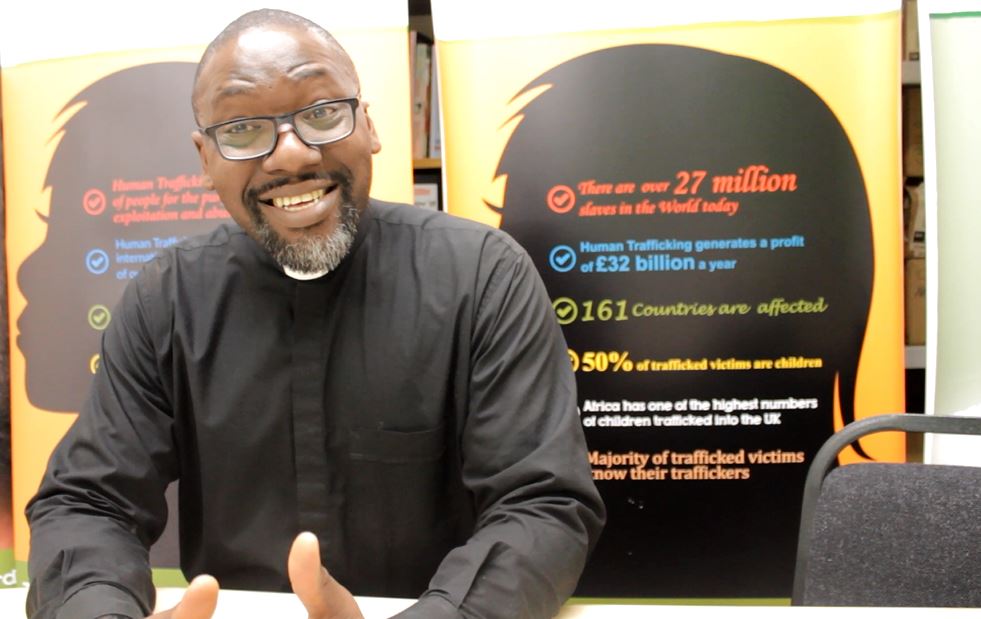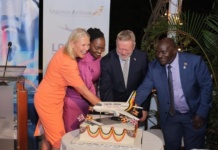Jide Macaulay, one of AFRUCA’s anti slavery ambassadors speaks to African Voice on what the charity does with modern slavery.

I have been a champion for AFRUCA’s volunteer for many years. Practically, what AFRUCA does is provide information around safe guarding children from abuse generally, particularly to African families, to prevent those children from being taken away from the family and put into social care.
With reference to domestic slavery, as an ambassador, I create awareness, particularly within the faith community. I will be focusing on how the church should receive information, the awareness in the Christian community and other faith community to be more particularly focused. We do know that a lot of Nigerians go to church, so if there are issues around domestic slavery, I think the church should be part of the group of people to be more aware of what is going on.
Identifying victim of domestic slavery
A victim of domestic abuse will be obviously a person in a sorry state. A person who appears victimised, helpless, who does not know their rights and they could be children. Domestic slavery affects adults as well. The current AFRUCA projects are actually focused on children, so we will be looking at some of the signs in children we are trying to help who don’t have confidence in themselves, who don’t have the knowledge of reporting or seeking for help. There will be a number of things we will be looking for in those we’ll be seeking to help. Vulnerability, if the person is looking ill, looking haggard, not quite well dressed, all the little things we take for granted. We’ll be looking for signs of physical abuse as well. The fact that a child has not been for any medical attention could also be what we could be looking at as a sign to investigate. I think primarily it is important to create awareness around many of these issues.
Does the work of AFRUCA involve reaching out to countries such as Nigeria where some of the victims originate?
Not particularly, I think we are looking at those who have actually arrived in the UK and the impact by those here in the UK. But the work of AFRUCA, which obviously has an impact within Nigeria, AFRUCA currently works with agencies and consultants and various charities in Nigeria. AFRUCA does not have an office in Nigeria so to say.
When you say to “children in the UK”, what age range do you work with?
We refer to age 0 to 17 years old, just under 18 years are classified as children under the UK law. It doesn’t mean that AFRUCA does not listen to stories of abuse of anyone over the age of 18, we can work with vulnerable adults within the context of our work.
How can the Diaspora support the work you are doing in AFRUCA?
The Diaspora can support in many ways. Let us start with the local communities. They need to be increasingly aware of domestic abuse in itself or domestic slavery. It stems out of human trafficking itself. We have to be quite clear about why people are being moved, what people are being offered for being taken abroad. What are the circumstances are these legal or private arrangements? We also need to look at guidelines. Is this guideline robust in Nigeria? If they are, are they being followed, are they being adhered to? If there are laws to safeguard children who are abused, then the movement of children needs to be guided by principles. Are they also being utilised? The problem is not that the children are moved; it is the fact that the children are moved and then exploited and abused. It is not just the children that suffer but also their families back in Nigeria.
How can the Diaspora community help victims?
A lot of victims do not know their rights. They live in fear of the people who have brought them to this country or whomever they are with. It is important that neighbors and members of various communities, that might notice that a child looks completely out of place, should be able to make a report. There is an anonymous line on Modern Day Slavery helpline that people can call. It is a free phone number where people can report a concern anonymously. That is one stage, the other is for them to be able to speak with the adult or the household where the child is staying, or if they feel, they will not listen, then they can use the Modern Slavery helpline confidentially.
Please talk us through the kind of help a victim will get once they are rescued?
The support that is often available is that they will get support of a social worker, if they are identified as being at risk, they will probably get about 45 days in some cases up to 150 days accommodation, where they can settle themselves down and think about what the next stage. Of course, if they are very young people, it means that they will be on a longer journey of being resettled in the country. I think that the other option is that, some of these young people might decide to go back home, and then preparations will be made for the right traveling documents to get them back to their family in the country of origin. Even when they get back to their country of origin, there will be provisions to support them while they resettle back. Bear in mind that they must be coming out of a traumatic experience. They will get counseling, they will get support for accommodation; they will also get legal aid in order to move their cases forward. Specialist’s advice and advocacy will definitely take place. If the young person or young adult feel that they are increasingly in fear of being returned to Nigeria, they still have the opportunity to apply for discretionary leave or asylum to stay in the UK. But if they want to go back, it is called the Voluntary Return Scheme and paid for by the UK government.
Modern day slavery is illegal in the UK; it is a system of exploitation. The perpetrators will be prosecuted and jailed according to the law.
To report concerns, seek advice, or get help, call the UK Modern Slavery Helpline 0800 012 1700 or visit the website www. modernslaveryhelpline.org.
For more information about the work of The Salvation Army go to www. salvationarmy.org.uk/human-trafficking
Kindly follow us on twitter:@AfricanVoice2








